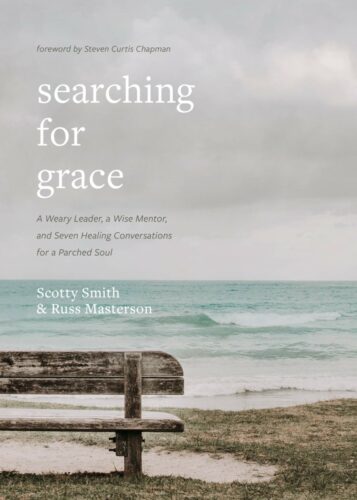Hide and seek. A child’s game — a game that my nephew is terrible at because he only has one hiding spot. But perhaps I’m terrible at it too, for I always find myself hiding from God in my same messy, shame-filled spot.
Scotty Smith and Russ Masterson’s Searching For Grace is an earnestly inviting book, full of vulnerable storytelling and deep gospel wisdom. The book follows the conversations between Masterson and his mentor, Smith, as they carve out an intentional dialogue surrounding what it means to find grace in the midst of anxiety, fear, suffering, grief, and shame:
Apart from the garments of God’s grace — given to us freely in the gospel — we’ll reach for the rags of some futile covering. Shame has to do with being seen, and we are convinced that being fully seen by God would destroy us. To be seen as we really are is just too much to fathom. Our guilt and shame demand a payment we can’t pay. (p. 36)

The Law always exposes our fallenness, always reveals our true nature, and displays us in ways that we don’t like to see and certainly in ways we don’t want others to see. Shame debilitates; it is the weight on our shoulders that keeps getting heavier and heavier the longer we sit in it. It is the feeling of despair when we keep on falling into the same sin no matter how much we try not to. It is too natural a response when we don’t meet our own expectations or those of others. We fear failure and thus are afraid to even make a move for fear of the impending feeling of humiliation and embarrassment.
Shame rears its ugly head no matter how much I brag about my own self-awareness. Because self-awareness fails to make me better than anyone else, nor does it absolve me of my guilt. The shame doesn’t just demand a payment that can be paid by our exertions. It adds on compounding interest.
As Masterson details so profoundly, shame is written into our DNA, arising from the Bible’s very first story:
This root of fear took hold well before my birth in 1979. Ever since sin and death invaded God’s world in Genesis, we have questioned God’s love for us. We have doubted our welcome and our wholeness.
In the first few chapters of Genesis, the first man and woman are afraid.
Afraid of the one who never needed them but desired them and greatly delighted in them, they hid.
Afraid of each other, they blamed and shamed each other.
Afraid of themselves, they covered their nakedness with wilting fig leaves.
Shalom had been shattered, and peace had been violated.
Fear haunts and hounds my heart too.
How broken is my brokenness? I wonder. Is there beauty still in me? I am afraid, so I hide.
As often as I’d been taught about (and even preached about) God’s love, my heart was feeling more unsettled than content. My fears felt larger than the love. Fear of loss, fear of loneliness, fear of not being enough and not having enough, fear of exposure, fear of death — there are as many fears in the heart as there are galaxies. Those swirling fears were distracting me from God’s gentle yet persistent question. It’s the same question he’d asked Adam and Eve so long ago — one he asks for our benefit, not for his information:
“Where are you?”
We may be prone to wander, but he is even more prone to seek and to find.
It’s a testimony to the ultimate Author that the most repeated command in the Bible isn’t some form of “Get your act together” but rather, “Do not be afraid.” That command shows up throughout the Bible, not as an indictment but as an invitation. I needed to learn that God meets me in my fears — the very place I run from. (p. 25-27)
In order to be good at hide and seek, you have to find a really good hiding place. And honestly, being found isn’t all that fun: either you were found first, and lost the game, or you were found last, and had to wait a long time. Either way, your hiding place is always revealed — and then you’re exposed. The game always ends in yet another failure.
The good news that Masterson and Smith so eloquently and urgently articulate isn’t that you have been found, but rather who you were found by and what happens when you are found. It is Jesus who finds us. And when He finds us, He doesn’t condemn us. He doesn’t say, “I told you so.” Jesus pays the price of our guilt and shame (with interest). He takes the weight of shame bearing down on our shoulders, puts it on His, and invites us home.

COMMENTS
Leave a Reply



COMMENTS
Leave a Reply












